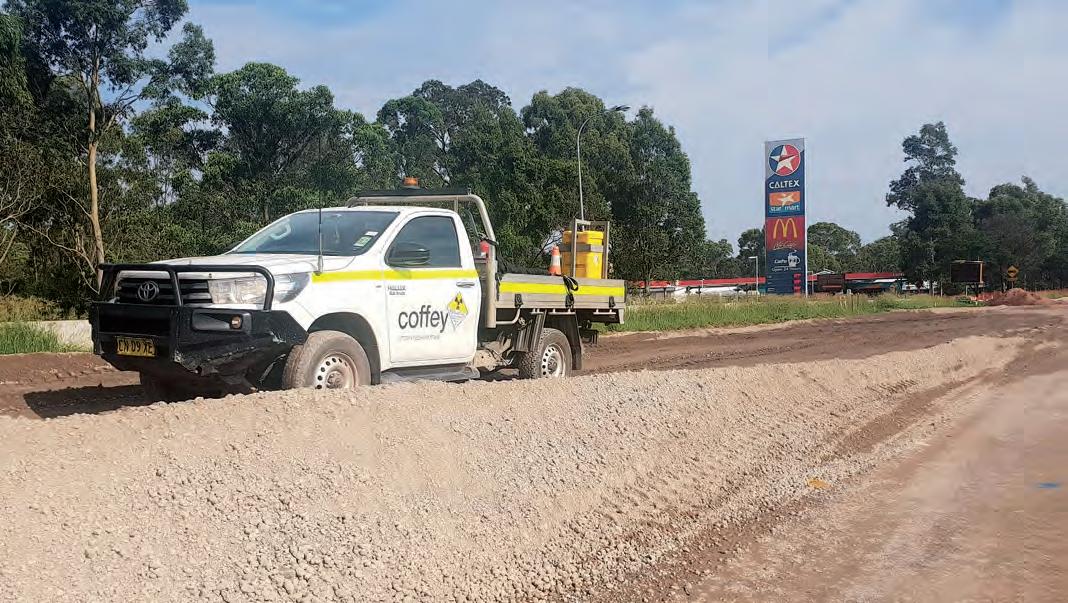
5 minute read
Quality testing
INDEPENDENT INFRASTRUCTURE
TESTING
TESTING IS A CRUCIAL ASPECT OF EACH STEP IN THE CONSTRUCTION OF INFRASTRUCTURE, FROM RESEARCH AND DEVELOPMENT RIGHT THROUGH TO DESIGN AND IMPLEMENTATION. ROADS & INFRASTRUCTURE SPEAKS WITH COFFEY TESTING TO FIND OUT WHY CONFORMANCE IS CRUCIAL FOR INNOVATION.
Standards underpin every facet of infrastructure construction right through from the foundations to asset monitoring.
To ensure the entire construction industry is building quality assets, whether a utility pipe or recycled glass sand is being used, product standards apply.
As an innovative industry, road construction contractors and engineers are consistently looking for more sustainable, efficient, resourceful and cost-effective materials or processes.
Independent testing is an essential tool when it comes to the implementation of new products or designs. This can ensure anything new brought to market meets or exceeds standard expectations and will perform well in application.
This is where independent construction materials evaluator Coffey Testing comes in. Any materials supplied for infrastructure projects such as roads, dams, airports or high-rise buildings must meet specification and can be tested by Coffey to prove conformance.
In addition, the company can act as a trusted advisor for practical and cost-
Coffey Testing can evaluate materials for a range of infrastructure projects. effective approaches to construction works.
Whether the specifications are standard or are set by engineers on these projects, Coffey act as an independent verifying body to ensure the plans and subsequently the chosen materials meet requirements on projects.
The company has been closely watching the emergence of recycled material initiatives for infrastructure builds, such as Recycled First in Victoria and NSW’s Waste Less, Recycle More initiative, and has been developing its capabilities to meet the growing recycled material demand.
Coffey Testing Laboratory Manager, Cameron Bik says the company do a range of testing for material specification work, stockpile performance, quarry material testing and more.
“For example, we are really looking into rehabilitation of old pavement at the end of their service life, we are looking at ways to manipulate the original material with binders and other solutions to rejuvenate those materials to give it another lifecycle,” Bik says.
“We already do a lot of work with quarries for recycled crushed concrete products. In the last six months we’ve worked on an asphalt project which is using recycled printer cartridges and tyres to produce their asphalt mixes.”
Carl Witherspoon, Coffey Testing Technical Sales Manager, says recycled products or recycling initiatives are in some cases being weighted during the tender process.
“Some projects are stipulating that a contractor must use a percentage of recycled materials, which makes testing ever more
Coffey Testing act as an independent verifying body to ensure plans and materials meet project requirements.

pertinent,” Witherspoon says.
One project the Coffey team recently completed, involved testing of 200,000 tonnes of crushed concrete.
“I think we are going to see a time on site where the recycled materials outweigh traditional materials. It’s going to be increasingly important for contractors to understand what materials to use and how best to use them on any project.”
Witherspoon says contractors that have worked with Coffey say they know they can rely on the testing results and be assured they are reducing waste but also producing good quality infrastructure.
Not only is recycling being implemented in major projects but throughout local council projects too, Bik says.
“We’ve been working closely with local councils in regional areas trying to utilise recycled materials locally sourced which are often won from the same site, this overcomes the localised issues of exhausting their limited resources. At times, we have worked on projects using recycled crushed glass as a drainage material and even utilising printer cartridges and old tyres to produce wearing courses on pavements.” he says.
“For some of these regional councils, we are given them the opportunity to expand their road rehabilitations 10-fold by recycling the existing pavements and working with them to make the most of their budgets. This is especially critical in areas who don’t have waste facilities or quarries nearby which results in the haulage fees and tipping fees being the largest cost on the project.” Foamed bitumen is one material the company is looking at expanding testing of. With stabilisation, Coffey has performed extensive testing using cementitious binders, but for material in poor condition, such as low-lying areas that are susceptible to flooding, foamed bitumen is being investigated to be used for pavement improvement.
“We think foamed bitumen can encapsulate and rehabilitate a wider array of materials. So, for really poor-quality materials that would otherwise be regarded as waste, foamed bitumen is giving us a chance to reuse it,” Bik says.
“With a three percent bitumen additive to a really poor-quality material we are getting really high strength pavements which are surpassing 20 to 30 years for a pavement life.”
He says recycled crushed glass is also commonly used in regional applications especially when quarried materials may not be readily available.
“We are lucky to work with councils, private contractors, Transport and Main Roads Queensland and Roads and Maritime Services to trial foamed bitumen pavements so that we can understand which products and processes work best.”
Being a partner for innovative trials is an important aspect of Coffey Testing’s work, to ensure quality outcomes for the suppliers and constructors that are finding innovative ways to use new or recycled materials.
Advice on the use of natural or recycled materials and aggregates, material improvement, stabilisation and modification options, asphalt mix design, concrete materials and mix design and design audit functions are the main areas Coffey Testing are equipped for when it comes to road construction.
The testing team also specialise in asphalt, bitumen and polymer modified binders, concrete, granular and segmental block units.
As the scope and use of recycled or alternative road materials grows, Coffey Testing will continually adapt and increase their testing scope to meet industry demands and ensure projects can be innovative and ultimately successful.










